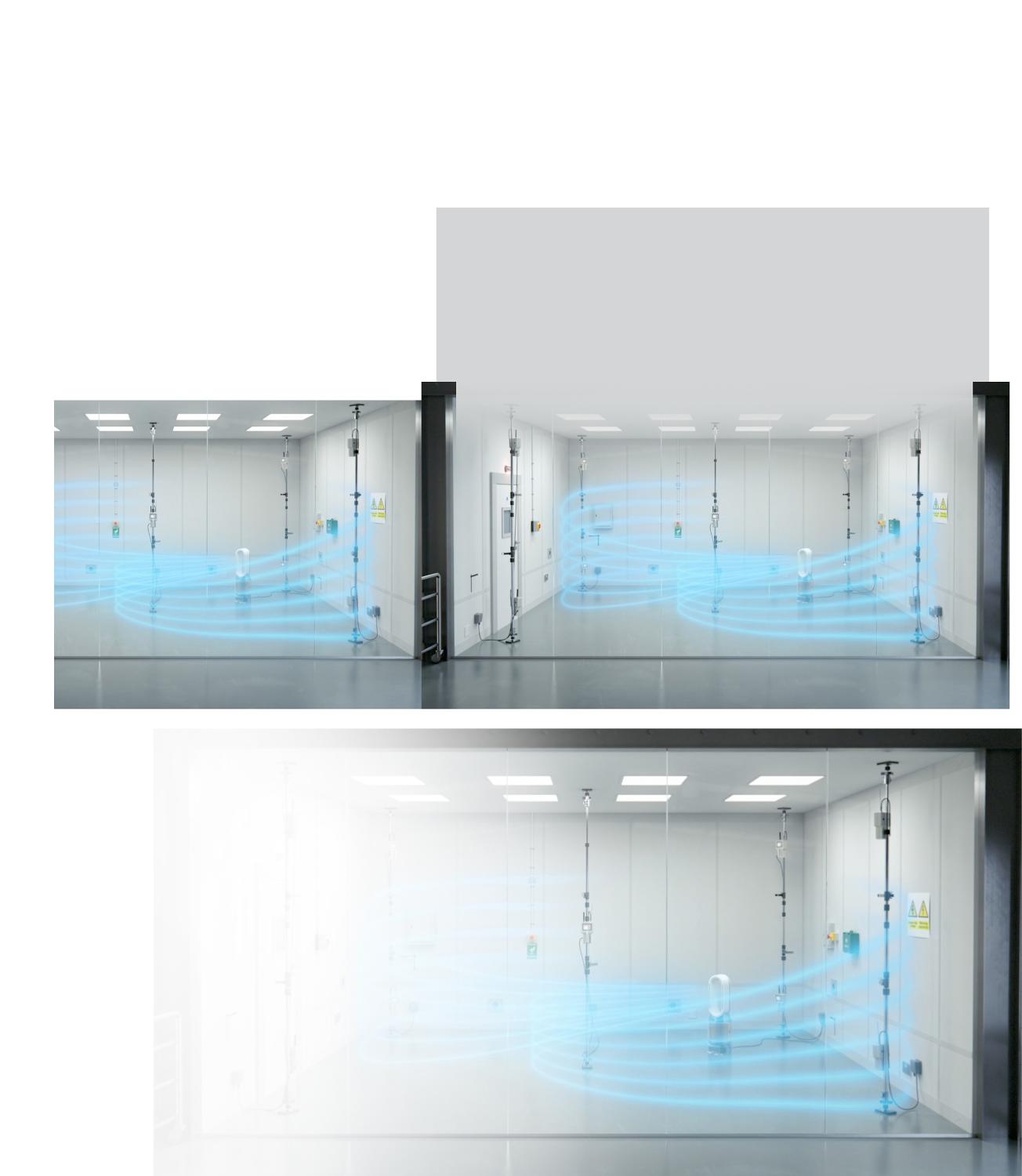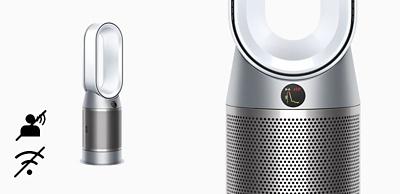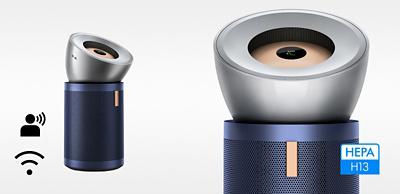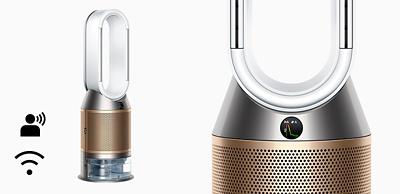
The Dyson indoor pollution guide
Check which pollutants could be hiding where you live by exploring our indoor pollution guide.
Keep your whole room warm and your air clean this winter
Roaring fires and flickering candles can release inhalable pollutants into your home in winter.
Dyson air purifiers automatically diagnose your air quality – sensing and capturing airborne particles¹, and displaying real-time reports on the LCD screen or your MyDyson™ App².
This is a carousel with slides. Use Next and Previous buttons to navigate, or jump to a slide with the slide dots.
Pollutants from burning candles
In winter, burning candles can make a home feel cosy. But they also release pollutants into the air that you breathe, including VOCs such as benzene, which can be harmful when inhaled.

Pollutants from burning candles
In winter, burning candles can make a home feel cosy. But they also release pollutants into the air that you breathe, including VOCs such as benzene, which can be harmful when inhaled.
Common pollutants found in the home
We're spending more time indoors, in increasingly well-insulated homes and workplaces. Over time, these common indoor air pollutants can build up.

Common pollutants found in the home
We're spending more time indoors, in increasingly well-insulated homes and workplaces. Over time, these common indoor air pollutants can build up.
Airborne mould spores
Mould isn’t just unsightly – it’s also a potentially harmful allergen. Airborne mould spores from outdoors can enter the home on people, pets and objects. Flourishing in damp places around the home, such as window frames.

Airborne mould spores
Mould isn’t just unsightly – it’s also a potentially harmful allergen. Airborne mould spores from outdoors can enter the home on people, pets and objects. Flourishing in damp places around the home, such as window frames.
Pollutants from burning candles and fireplaces
In winter, fires and candles can make a home feel cosy. But they also release pollutants into the air that you breathe, such as ultrafine particles from burning wood and VOCs including benzene from candles.

Pollutants from burning candles and fireplaces
In winter, fires and candles can make a home feel cosy. But they also release pollutants into the air that you breathe, such as ultrafine particles from burning wood and VOCs including benzene from candles.
Bacteria and viruses
When people are spending more time together indoors, bacteria and viruses can spread easily. Dyson purifier heaters are engineered to capture 99.9% of viruses³, providing you with cleaner air.

Bacteria and viruses
When people are spending more time together indoors, bacteria and viruses can spread easily. Dyson purifier heaters are engineered to capture 99.9% of viruses³, providing you with cleaner air.
Pollutants from burning candles
In winter, burning candles can make a home feel cosy. But they also release pollutants into the air that you breathe, including VOCs such as benzene, which can be harmful when inhaled.

Pollutants from burning candles
In winter, burning candles can make a home feel cosy. But they also release pollutants into the air that you breathe, including VOCs such as benzene, which can be harmful when inhaled.
Common pollutants found in the home
We're spending more time indoors, in increasingly well-insulated homes and workplaces. Over time, these common indoor air pollutants can build up.

Common pollutants found in the home
We're spending more time indoors, in increasingly well-insulated homes and workplaces. Over time, these common indoor air pollutants can build up.
Airborne mould spores
Mould isn’t just unsightly – it’s also a potentially harmful allergen. Airborne mould spores from outdoors can enter the home on people, pets and objects. Flourishing in damp places around the home, such as window frames.

Airborne mould spores
Mould isn’t just unsightly – it’s also a potentially harmful allergen. Airborne mould spores from outdoors can enter the home on people, pets and objects. Flourishing in damp places around the home, such as window frames.
Pollutants from burning candles and fireplaces
In winter, fires and candles can make a home feel cosy. But they also release pollutants into the air that you breathe, such as ultrafine particles from burning wood and VOCs including benzene from candles.

Pollutants from burning candles and fireplaces
In winter, fires and candles can make a home feel cosy. But they also release pollutants into the air that you breathe, such as ultrafine particles from burning wood and VOCs including benzene from candles.
Bacteria and viruses
When people are spending more time together indoors, bacteria and viruses can spread easily. Dyson purifier heaters are engineered to capture 99.9% of viruses³, providing you with cleaner air.

Bacteria and viruses
When people are spending more time together indoors, bacteria and viruses can spread easily. Dyson purifier heaters are engineered to capture 99.9% of viruses³, providing you with cleaner air.
Pollutants from burning candles
In winter, burning candles can make a home feel cosy. But they also release pollutants into the air that you breathe, including VOCs such as benzene, which can be harmful when inhaled.

Pollutants from burning candles
In winter, burning candles can make a home feel cosy. But they also release pollutants into the air that you breathe, including VOCs such as benzene, which can be harmful when inhaled.
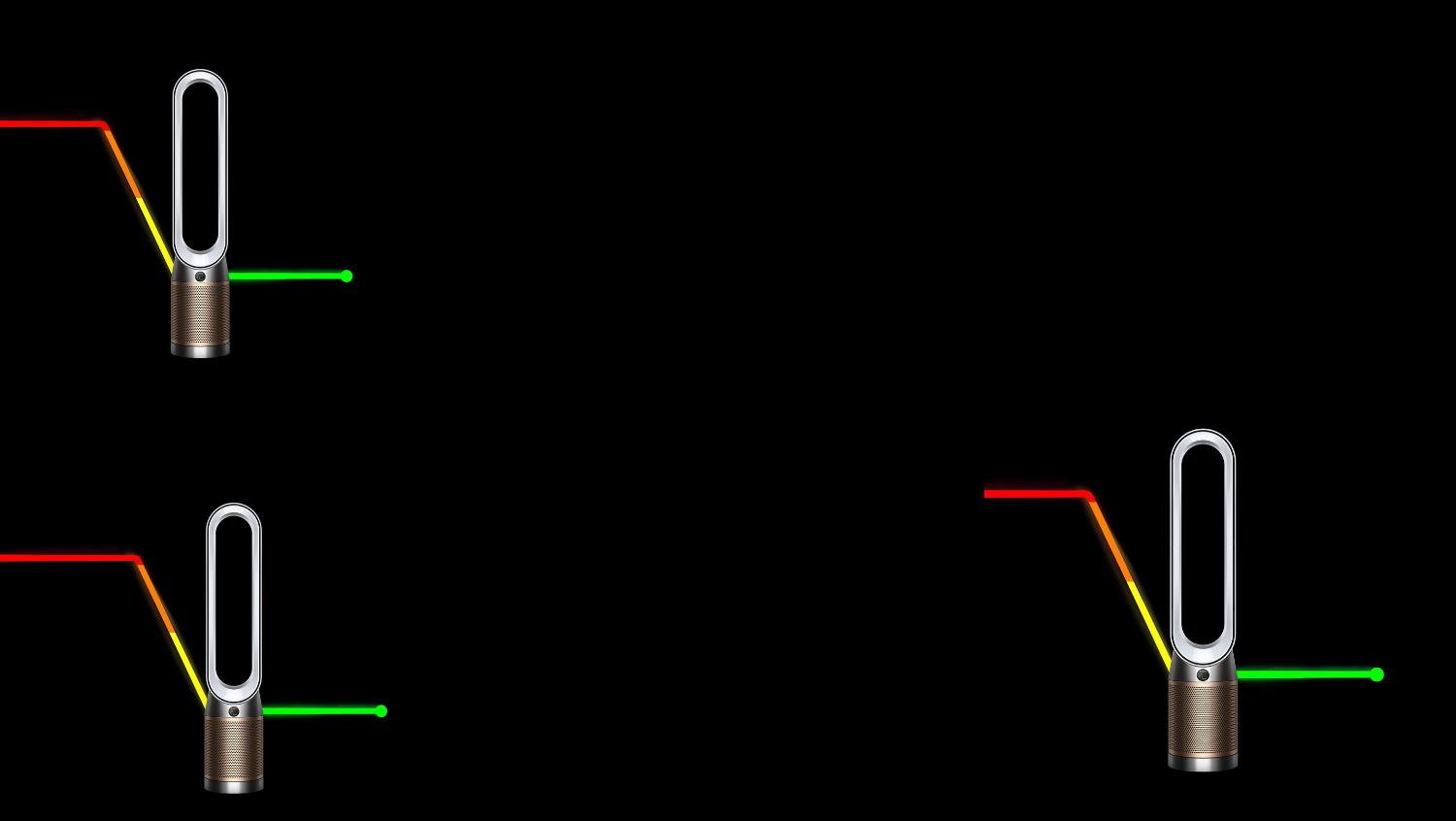
Three key things to look for in an air purifier
Automatic sensing, a fully-sealed machine and long-range air projection are key to effective air purification. That's why they're at the core of our technology. And why we've been testing them for generations.
-
Automatic sensing
Reacts automatically to remove pollutants, only using energy when needed.¹
-
Fully-sealed machine
Fully sealed to HEPA H13 standard. So the pollution captured inside stays inside.²
-
Long-range air projection
Dyson Air Multiplier™ technology projects purified air into every corner of the room.³
Tested for real homes
Standard Clean Air Delivery Rate (CADR) tests in small chambers with ceiling fans don't represent real living conditions.
So our engineers spent years developing a new testing methodology, called Point Loading Auto Response (POLAR), to measure real-world performance more accurately.
Find the right purifier for you
Try our indoor air pollution guide and find out which purifier is right for you and your home.
Choose your model
Dyson Purifier Hot+Cool™ HP7A Autoreact (White/Nickel)
156
Dyson Purifier Hot+Cool™ HP7A Autoreact (White/Nickel)
5
Star
86
4
Star
42
3
Star
10
2
Star
7
1
Star
11
Purifies and heats the whole room evenly. Cools you in summer.
Premium Dyson purification. 2-stage HEPA H13 filtration captures allergens, bacteria and odours.
Remote control.
2 accessories included
See all Hide2 accessories included
See all Hide-
Remote Control
Curved and magnetised to store neatly on the machine

-
360° Glass HEPA and Activated Carbon Filter
360 Combi Glass HEPA + Carbon air purifier 2-in-1 filter. We recommend replacing your filter every 12 months or when notified by your machine.

Dyson Purifier Big+Quiet Formaldehyde BP03
63
Dyson Purifier Big+Quiet Formaldehyde BP03
5
Star
46
4
Star
9
3
Star
4
2
Star
2
1
Star
2
Our quietest, most powerful purifier. For large spaces up to 100m². Also cools you.
Dyson's most advanced purification. 3-stage HEPA H13 filtration captures allergens, bacteria and odours. Destroys formaldehyde.
Live air quality reports via the MyDyson™ app. Voice, app and remote control.. Security software updates supported until 31/12/31.
What's included
See all HideWhat's included
See all Hide-
Carbon Filter
430,000m² of activated carbon removes odours and gases, including NO² – a common and potentially harmful household pollutant. Lasts two years.

-
Remote control
Curved and magnetised to store neatly on the machine.

-
HEPA H13 grade filter
Our re-engineered HEPA-H13 grade filter contains 21 metres of borosilicate microfibres, pleated over 450 times. To capture 99.95% of microscopic particles as small as 0.1 microns.⁶

Dyson HEPA Purifier Cool TP09 Formaldehyde Purifying Fan (White/Gold)
709
Dyson HEPA Purifier Cool TP09 Formaldehyde Purifying Fan (White/Gold)
5
Star
456
4
Star
102
3
Star
43
2
Star
37
1
Star
71
HEPA H13 purifier and fan. Ideal for larger spaces.
Detects and destroys formaldehyde. Automatically senses and displays real-time air quality
Control using the Dyson Link app and compatible voice services. Security software updates supported until 31/12/31.
What's included
See all HideWhat's included
See all Hide-
Remote control*
Curved and magnetised to store neatly on the machine

-
360° Glass HEPA and Activated Carbon Filter
360 Combi Glass HEPA + Carbon air purifier 2-in-1 filter. We recommend replacing your filter every 12 months or when notified by your machine.

Dyson Purifier Humidify+Cool™ PH04 Formaldehyde
583
Dyson Purifier Humidify+Cool™ PH04 Formaldehyde
5
Star
322
4
Star
77
3
Star
63
2
Star
36
1
Star
85
Purifies the whole room. Humidifies hygienically with UV light. Also cools you.
Advanced Dyson purification. 3-stage HEPA H13 filtration captures allergens, bacteria and odours. Destroys formaldehyde.
Live air quality reports via the MyDyson™ app. Voice, app and remote control. Security software updates supported until 31/12/31.
Remote Control Curved and magnetised to store neatly on the machine.
See all HideRemote Control Curved and magnetised to store neatly on the machine.
See all Hide-
360° Glass HEPA and Activated Carbon Filter
360 Combi Glass HEPA + Carbon air purifier 2-in-1 filter. We recommend replacing your filter every 12 months or when notified by your machine.

-
Remote control

-
Power supply
Power supply for your Dyson purifier humidifier.

Representative example: purchase rate 23.9% p.a. (variable), representative 23.9% APR (variable), based on a credit limit of £1,200.
This represents the typical costs of using a Paypal Credit limit, not including instalment offers. Paypal credit is a credit line to fund purchases made online. For more information about how Paypal Credit works click here.
PayPal Credit customers who make purchases on the Dyson website will qualify for a promotional rate of 0% p.a. For example a £1,200 purchase split over 12 monthly payments at 0% p.a. would cost £100.00 per month using PayPal Credit. Subject to credit approval. Terms and conditions apply. Credit subject to status. Dyson Limited acts as a broker and offers credit from PayPal Credit, PayPal Credit is a trading name of PayPal UK Ltd, Whittaker House, Whittaker Avenue, Richmond-Upon-Thames, Surrey, United Kingdom, TW9 1EH.
Estimate your monthly payments
Use our calculator to see your estimated monthly payments over a range of periods. All repayments shown are estimates. Subject to approval, terms apply. Estimate only. Repayments will be confirmed during application.
*Required fields
Promotion
Frequently asked questions
Indoor air pollution contains a mix of pollutants, including particulate matter (PM) and volatile organic compounds (VOCs).
Many indoor activities and household products release invisible pollutants. As our homes become increasingly well-sealed, it may seem like we're shutting pollution out – but in truth, we may be shutting it in.
What are the main indoor air pollutants?
Four indoor air pollutants which may be causing poor air quality in your home are:
Mould. Moulds are fungi that reproduce by making and releasing spores. It's usually found where there is excess moisture.
Volatile organic compounds. Or VOCs, can be released from building materials, personal care and cleaning products.
Particulate matter. These can include dust, smoke and exhaust fumes. Particles vary from PM0.1 - PM10 in size.
Allergens. Common allergens include pollen and pet dander. Biological pollutants from pets include multiple proteins in a pet’s fur, hair, saliva, urine or dander.
Dyson's sealed HEPA filters capture 99.95% of microscopic allergens and pollutants as small as 0.1 microns (PM0.1).*
How do I Improve indoor air quality?
Here are a few actions you can take to improve the air quality in your home:
Invest in an air purifier. Your best solution for improving your indoor air quality is an air purifier. Be sure to choose one which automatically senses, is fully sealed, and has long-range air projection.
Get rid of dust. House dust can be a combination of dust mites, pet dander and pollen. Keeping on top of cleaning and vacuuming can help overall air quality.
Source control. Reduce pollution sources in your home (like burning scented candles).
How does the Dyson purifier range differ?
Dyson engineers are perfectionists. Channelling our relentless dissatisfaction, we re-engineered the entire range to ensure every purifier is fully sealed to HEPA H13 standard.
This ensures we capture 99.95% of ultrafine particles and prevent pollutants from leaking back into the air you breathe.
Do Dyson machines capture viruses such as Covid-19?
Yes. Dyson air purifiers capture viruses, including the SARS-CoV-2/COVID-19 virus.*
What does VOC on my Dyson machine mean?
VOCs are 'Volatile Organic Compounds', meaning they are compounds containing carbon and are generally a gas at room temperature. Indoor VOCs can come from a range of activities, such as spraying perfumes or hair sprays, painting or cleaning.
When you see VOC on your machine's monitor or in your MyDyson app, you're experiencing a rise in VOCs, and your machine is working hard to remove the pollutant from the air, and project cleaned air into your home.
What does PM2.5 on my Dyson machine mean?
PM2.5 is particulate matter with a size of 2.5 microns or less, for example dust, ash and smoke particles. These can be released from a range of household activities such as burning candles or cooking.
When you see PM2.5 on your machine's monitor or in your MyDyson app, you're experiencing a rise in PM2.5, and your machine is working hard to remove the pollutant from the air, and project cleaned air into your home.






